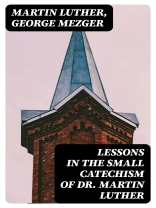In ‘Lessons in the Small Catechism of Dr. Martin Luther, ‘ the anthology presents a deep dive into the theological and pedagogical insights of one of Protestantism’s foundational figures. The collection navigates the intricacies of Christian doctrine as distilled in Luther’s Small Catechism, opening layers of interpretation through diverse literary styles ranging from exegetical commentary to poetic reflection. The anthology’s remarkable divergence yet cohesive thematic focus draws readers into a broad yet unified exploration of faith, education, and devotion. Standout pieces challenge conventional readings, providing new insights without losing the reverence and authority Luther’s work commands. The anthology’s contributors, prominently featuring pieces by Martin Luther himself and George Mezger, offer a rich tapestry of interpretations that underscore the historical and cultural contexts of Reformation theology. The intersection of Luther’s doctrinal clarity and Mezger’s interpretative expansions reveal a dialogue that captures a pivotal moment in religious history. Collectively, the voices within this volume highlight the catechism’s role in shaping Protestant educational and liturgical practices. Their contributions not only accentuate the ongoing relevance of Reformation thought but also invite theological inquiry and reflection. This collection serves as an invaluable resource for readers seeking a nuanced understanding of Lutheran doctrine and its theological heritage. It presents a multi-dimensional platform for engaging with the spiritual, educational, and interpretive traditions stemming from one of Christianity’s pivotal epochs. Scholars, theologians, and readers interested in the crossroads of history and faith will find ‘Lessons in the Small Catechism of Dr. Martin Luther’ an indispensable volume that deepens one’s appreciation for the complexities and synergies within Lutheran catechetical instruction, fostering a vibrant dialogue across time and belief.
Despre autor
Martin Luther (1483–1546) was a seminal figure in the Protestant Reformation, an intellectual movement that forever transformed Christianity and Western civilization. An Augustinian monk, theologian, and university professor at Wittenberg, Luther’s actions and writings catalyzed religious reforms. His disputation against the sale of indulgences, famously epitomized in his ’95 Theses, ‘ challenged the authority of the Catholic Church and sparked widespread theological debate. Luther’s translation of the Bible into the vernacular made the scriptures accessible to the laity, fostering a new relationship between believers and the Word of God. Evident in works such as ‘Lessons in the Small Catechism of Dr. Martin Luther, ‘ his literary style combined a pastor’s care for the layperson with the rigor of a scholar. The Small Catechism itself distilled complex theology into accessible teachings, confirming Luther’s commitment to education and the empowerment of ordinary Christians. The ripple effects of Luther’s theology were immense, influencing not only religious institutions but also shaping the course of politics, economics, and education in Europe. Luther’s enduring legacy can be seen in the Lutheran denomination, which bears his name, and in the broader Protestant tradition to which he significantly contributed.












